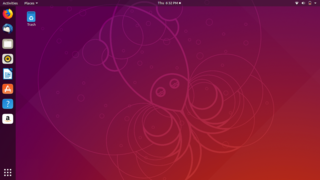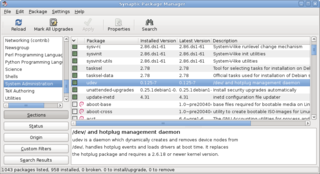This page is based on this
Wikipedia article Text is available under the
CC BY-SA 4.0 license; additional terms may apply.
Images, videos and audio are available under their respective licenses.

A Linux distribution is an operating system made from a software collection, which is based upon the Linux kernel and, often, a package management system. Linux users usually obtain their operating system by downloading one of the Linux distributions, which are available for a wide variety of systems ranging from embedded devices and personal computers to powerful supercomputers.

A package manager or package management system is a collection of software tools that automates the process of installing, upgrading, configuring, and removing computer programs for a computer's operating system in a consistent manner.

Source Mage is a Linux distribution. As a package is being installed, its source code is automatically downloaded, compiled, and installed. Source Mage is descended from Sorcerer.
Arch Linux is a Linux distribution for computers based on x86-64 architectures.
Commercial software, or seldom payware, is computer software that is produced for sale or that serves commercial purposes. Commercial software can be proprietary software or free and open-source software.
Freely redistributable software (FRS) is software that anyone is free to redistribute. The term has been used to mean two types of free to redistribute software, distinguished by the legal modifiability and limitations on purpose of use of the software. FRS which can be legally modified and used for any purpose is the same as free software. Non-legally modifiable FRS is freeware, shareware or similar.

Autopackage is a free computer package management system aimed at making it simple to create a package that can be installed on all Linux distributions, created by Mike Hearn around 2002.

AppImage is a format for distributing portable software on Linux without needing superuser permissions to install the application. It tries also to allow Linux distribution-agnostic binary software deployment for application developers, also called Upstream packaging. Released first in 2004 under the name klik, it was continuously developed, then renamed in 2011 to PortableLinuxApps and later in 2013 to AppImage.
Salome is a free software that provides a generic platform for pre- and post-processing for numerical simulation. It is based on an open architecture made of reusable components. It is open source, released under the GNU Lesser General Public License, and both its source code and binaries may be downloaded from its official website.
In the context of free and open-source software, a binary blob is a closed-source binary-only piece of software. The term usually refers to a closed-source kernel module loaded into the kernel of an open-source operating system, and is sometimes also applied to code running outside the kernel, such as system firmware images, microcode updates, or userland programs. The term blob was first used in database management systems to describe a collection of binary data stored as a single entity.

gNewSense is a Linux distribution based on Debian, and developed with sponsorship from the Free Software Foundation. Its goal is user-friendliness, but with all proprietary and non-free software removed. The Free Software Foundation considers gNewSense to be composed entirely of free software.
A software repository, colloquially known as a "repo" for short, is a storage location from which software packages may be retrieved and installed on a computer.
The Ångström distribution is a Linux distribution for a variety of embedded devices. The distribution is the result of work by developers from the OpenZaurus, OpenEmbedded, and OpenSIMpad projects. The graphical user interfaces (GUIs) available are OPIE and GPE among other options.
In free and open source software, a software maintainer or package maintainer is usually one or more people who build source code into a binary package for distribution, commit patches, or organize code in a source repository.
BSD licenses are a family of permissive free software licenses, imposing minimal restrictions on the use and distribution of covered software. This is in contrast to copyleft licenses, which have share-alike requirements. The original BSD license was used for its namesake, the Berkeley Software Distribution (BSD), a Unix-like operating system. The original version has since been revised, and its descendants are referred to as modified BSD licenses.

Linux-libre is an operating system kernel and a GNU package.
The zlib license is a permissive free software license which defines the terms under which the zlib software library can be distributed. It is also used by many other free software packages. The libpng library uses a similar license sometimes referred interchangeably as the zlib/libpng license.

Void Linux is an independent Linux distribution that uses the XBPS package manager, which was designed and implemented from scratch, and the runit init system. Excluding binary kernel blobs, a base install is composed entirely of free software, but users can access an official non-free repository to install proprietary software.







